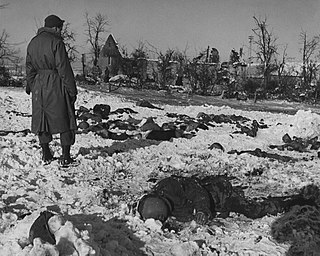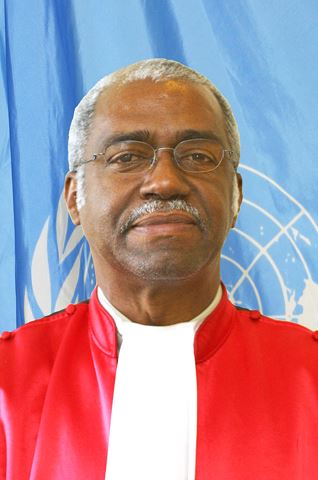International Crimes Tribunal or International Criminal Tribunal may refer to:

Genocide is the intentional destruction of a people in whole or in part. In 1948, the United Nations Genocide Convention defined genocide as any of five "acts committed with intent to destroy, in whole or in part, a national, ethnical, racial or religious group". These five acts were: killing members of the group, causing them serious bodily or mental harm, imposing living conditions intended to destroy the group, preventing births, and forcibly transferring children out of the group. Victims are targeted because of their real or perceived membership of a group, not randomly.

The International Criminal Tribunal for the former Yugoslavia (ICTY) was a body of the United Nations that was established to prosecute the war crimes that had been committed during the Yugoslav Wars and to try their perpetrators. The tribunal was an ad hoc court located in The Hague, Netherlands.

A war crime is a violation of the laws of war that gives rise to individual criminal responsibility for actions by combatants in action, such as intentionally killing civilians or intentionally killing prisoners of war, torture, taking hostages, unnecessarily destroying civilian property, deception by perfidy, wartime sexual violence, pillaging, and for any individual that is part of the command structure who orders any attempt to committing mass killings including genocide or ethnic cleansing, the granting of no quarter despite surrender, the conscription of children in the military and flouting the legal distinctions of proportionality and military necessity.
Universal jurisdiction is a legal principle that allows states or international organizations to claim criminal jurisdiction over an accused person regardless of where the alleged crime was committed, and regardless of the accused's nationality, country of residence, or any other relation to the prosecuting entity. Crimes prosecuted under universal jurisdiction are considered crimes against all, too serious to tolerate jurisdictional arbitrage. The concept of universal jurisdiction is therefore closely linked to the idea that some international norms are erga omnes, or owed to the entire world community, as well as to the concept of jus cogens – that certain international law obligations are binding on all states.

Crimes against humanity are widespread or systemic criminal acts which are committed by or on behalf of a de facto authority, usually by or on behalf of a state, that grossly violate human rights. Unlike war crimes, crimes against humanity can be committed during both peace and war. They are not isolated or sporadic events because they are part of a government policy or they are part of a widespread practice of atrocities which is tolerated or condoned by a government or a de facto authority. They do not need to be part of an official policy, but they only need to be tolerated by authorities.

The Rome Statute of the International Criminal Court is the treaty that established the International Criminal Court (ICC). It was adopted at a diplomatic conference in Rome, Italy on 17 July 1998 and it entered into force on 1 July 2002. As of November 2019, 123 states are party to the statute. Among other things, it establishes court function, jurisdiction and structure.
The Nuremberg principles are a set of guidelines for determining what constitutes a war crime. The document was created by the International Law Commission of the United Nations to codify the legal principles underlying the Nuremberg Trials of Nazi party members following World War II.

The International Military Tribunal for the Far East (IMTFE), also known as the Tokyo Trial and the Tokyo War Crimes Tribunal, was a military trial convened on 29 April 1946 to try leaders of the Empire of Japan for their crimes against peace, conventional war crimes, and crimes against humanity, leading up to and during the Second World War. The IMTFE was modeled after the International Military Tribunal (IMT) at Nuremberg, Germany, which prosecuted the leaders of Nazi Germany for their war crimes, crimes against peace, and crimes against humanity.
The Iraqi High Tribunal (IHT), formerly the Iraqi Special Tribunal and sometimes referred to as the Supreme Iraqi Criminal Tribunal, is a body established under Iraqi national law to try Iraqi nationals or residents accused of genocide, crimes against humanity, war crimes or other serious crimes committed between 1968 and 2003. It organized the trial of Saddam Hussein and other members of his Ba'ath Party regime.

International criminal law (ICL) is a body of public international law designed to prohibit certain categories of conduct commonly viewed as serious atrocities and to make perpetrators of such conduct criminally accountable for their perpetration. The core crimes under international law are genocide, war crimes, crimes against humanity, and the crime of aggression.

In the practice of international law, command responsibility is the legal doctrine of hierarchical accountability for war crimes, whereby a commanding officer (military) and a superior officer (civil) is legally responsible for the war crimes and the crimes against humanity committed by his subordinates; thus, a commanding officer always is accountable for the acts of commission and the acts of omission of his soldiers.

Patrick Lipton Robinson is a Jamaican member of the International Court of Justice for the term commencing February 2015. Prior to this he was formerly the President of the International Criminal Tribunal for the Former Yugoslavia, a position he held between 2008 and 2011 during which time his Chef de Cabinet was Gabrielle Louise McIntyre. He was first elected to the Tribunal in 1998 and has been re-elected twice since. In 2004, he presided over the trial of Slobodan Milošević, the former Yugoslav president.
ICCT is a four-character abbreviation with multiple meanings, and different capitalisations:
A war crimes trial is the trial of persons charged with criminal violation of the laws and customs of war and related principles of international law committed during armed conflict.

Joint criminal enterprise (JCE) is a legal doctrine used during war crimes tribunals to allow the prosecution of members of a group for the actions of the group. This doctrine considers each member of an organized group individually responsible for crimes committed by group within the common plan or purpose. It arose through the application of the idea of common purpose and has been applied by the International Criminal Tribunal for the former Yugoslavia to prosecute political and military leaders for mass war crimes, including genocide, committed during the Yugoslav Wars 1991–1999.
Anees Ahmed is an Indian lawyer. He served as the Chief of Judicial and Legal Affairs, and formerly the Head of Chambers, of the United Nations International Criminal Tribunal for Rwanda.
An atrocity crime is a violation of international criminal law that falls under the historically three legally defined international crimes of genocide, war crimes, and crimes against humanity. Ethnic cleansing is widely regarded as a fourth mass atrocity crime by legal scholars and international non-governmental organizations (NGOs) working in the field, despite not yet being recognized as an independent crime under international law.

The Doboj ethnic cleansing refers to war crimes, including murder, deportation, persecution and wanton destruction, committed against Bosniaks and Croats in the Doboj area by the Yugoslav People's Army and Serb paramilitary units from May until September 1992 during the Bosnian war. On 26 September 1997, Serb soldier Nikola Jorgić was found guilty by the Düsseldorf Oberlandesgericht on 11 counts of genocide involving the murder of 30 persons in the Doboj region, making it the first Bosnian Genocide prosecution. The International Criminal Tribunal for the former Yugoslavia (ICTY) classified it as a crime against humanity and sentenced seven Serb officials.
Jennifer Trahan is an American legal scholar and academic. She is a Clinical Professor at New York University's Center for Global Affairs and directs their Concentration in International Law and Human Rights.
The proposed International Criminal Tribunal for the Russian Federation is a proposed ad hoc international criminal tribunal aimed at prosecuting the Russian Federation and senior Russian and Belarusian leaders for the Russian invasions of Ukraine as one or more crimes of aggression, as a complement to the existing International Criminal Court investigation in Ukraine. Several international bodies announced their support for its establishment, including the Council of Europe, the European Commission, the NATO Parliamentary Assembly and the European Parliament.